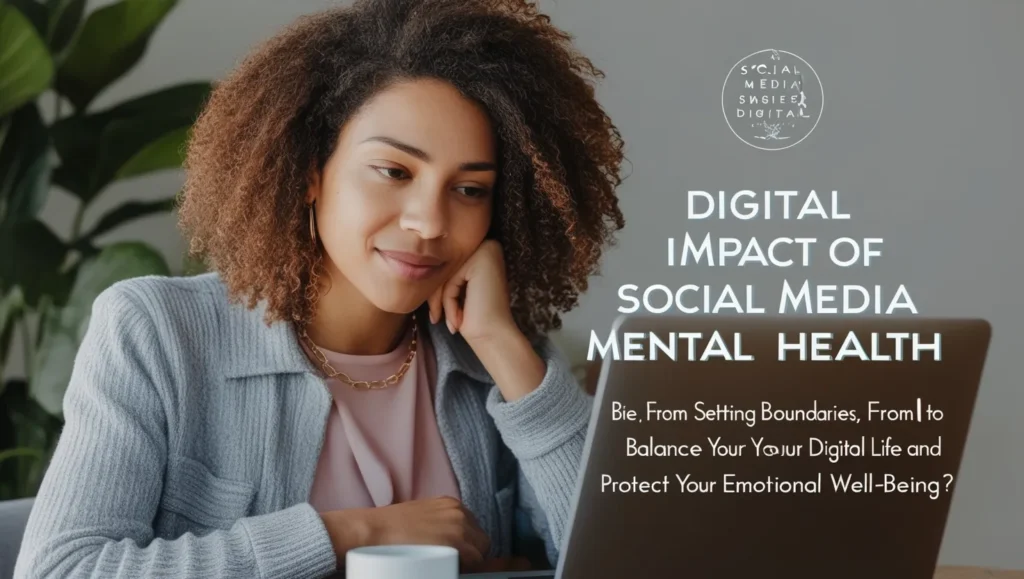How Social Media Affects Your Mental Health
How Social Media Affects Your Mental Health has become an integral part of our lives, shaping how we communicate, learn, and entertain ourselves. However, its pervasive presence also brings challenges, particularly regarding mental health. While social platforms offer countless benefits, they can contribute to stress, anxiety, and other emotional struggles, collectively known as “digital stress.”
In this blog, we’ll explore how social media affects mental health and share strategies to mitigate its negative impact.
Understanding Digital Stress
Digital stress refers to the anxiety and mental strain caused by excessive use of digital devices and online platforms. Social media, with its endless streams of content, interactions, and expectations, is a major contributor.
Key contributors to digital stress include:
- Information Overload: Constant exposure to a barrage of news, updates, and opinions can overwhelm the mind.
- Comparison Culture: Seeing curated highlights of others’ lives often leads to feelings of inadequacy.
- Cyberbullying: Online harassment or negative comments can deeply affect self-esteem and emotional well-being.
- Fear of Missing Out (FOMO): The pressure to stay updated and involved can create feelings of exclusion.
The Effects of Social Media on Mental Health
While social media isn’t inherently harmful, its overuse or misuse can trigger several mental health challenges:
1. Increased Anxiety and Depression
Frequent exposure to negative news, societal pressures, or unachievable beauty standards can fuel anxiety and depressive symptoms. Constant comparison often leads to a distorted sense of self-worth.
2. Poor Sleep Patterns
Scrolling through social media late at night disrupts sleep hygiene. The blue light emitted by screens affects melatonin production, making it harder to fall asleep.
3. Reduced Attention Span
Endless scrolling and quick consumption of short-form content can impair focus and make it difficult to concentrate on long-term goals or tasks.
4. Negative Body Image
Images of filtered, picture-perfect appearances can perpetuate unrealistic beauty standards, especially among teenagers and young adults.
5. Isolation Despite Connectivity
Ironically, excessive use of social media can lead to feelings of loneliness as online interactions replace meaningful face-to-face connections.
How Social Media Affects Your Mental Health
While it’s nearly impossible to eliminate social media entirely, there are ways to reduce its negative effects and build healthier online habits.
1. Set Boundaries for Social Media Use
- Limit screen time with app timers or digital well-being tools.
- Establish “no-phone zones” in areas like the bedroom or during meals.
2. Curate Your Feed Thoughtfully
- Follow accounts that inspire and uplift you.
- Unfollow or mute profiles that trigger negative emotions or comparison.
3. Practice Mindful Social Media Use
- Be intentional about your time online rather than aimlessly scrolling.
- Reflect on your emotions after using social media to identify triggers.
4. Prioritize Real-Life Connections
- Dedicate time to nurturing offline relationships.
- Engage in activities that bring joy, such as hobbies, exercise, or volunteering.
5. Take Regular Breaks
- Consider a social media detox or periodic “unplugged” days to recharge mentally.
- Use this time to focus on mindfulness or pursue goals that don’t require technology.
6. Seek Professional Support if Needed
- If social media is causing significant emotional distress, consider seeking help from a mental health professional.
- Therapies like cognitive behavioral therapy (CBT) can offer strategies to manage digital stress effectively.
The Positive Potential of Social Media
It’s important to acknowledge that social media isn’t entirely detrimental. When used mindfully, it can:
- Foster communities and support networks.
- Provide access to valuable information and learning resources.
- Amplify important causes and voices.
- Encourage creativity and self-expression.
By balancing its benefits and drawbacks, How Social Media Affects Your Mental Health
Final Thoughts
How Social Media Affects Your Mental Health is a growing challenge in our tech-driven world, but by adopting mindful habits and creating boundaries, you can protect your mental health while still enjoying the positive aspects of social media. Remember, your mental well-being is more important than likes, shares, or followers. Take control of your online experience, and use social media as a resource that enriches, rather than detracts from, your life.

